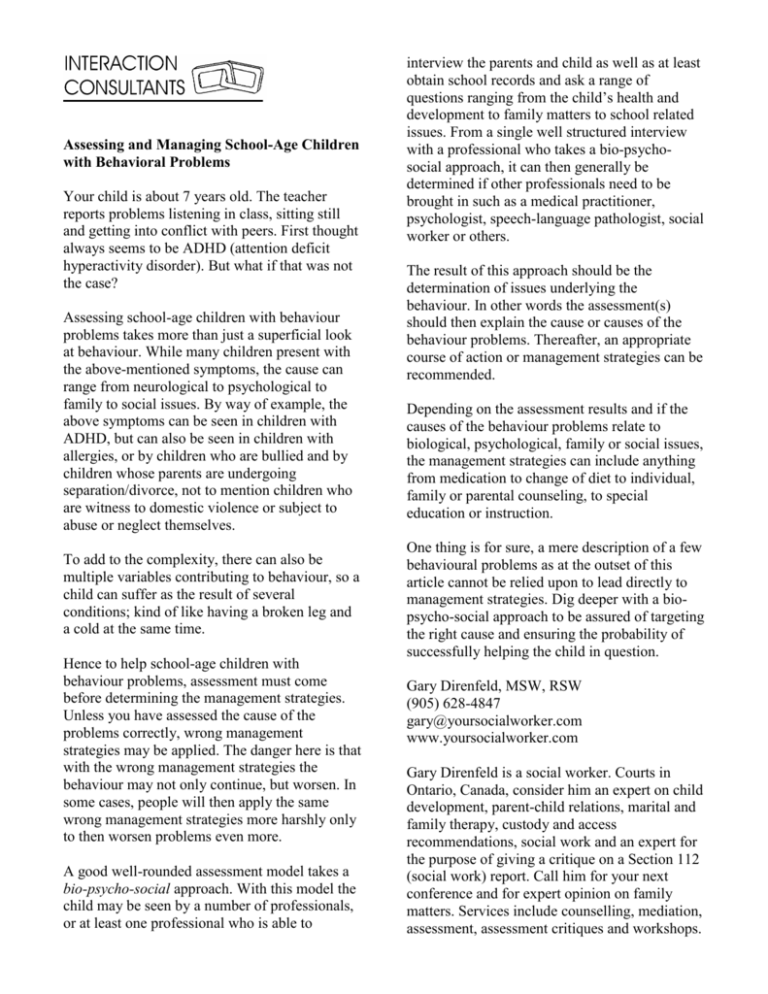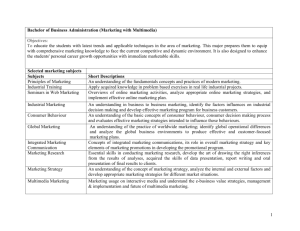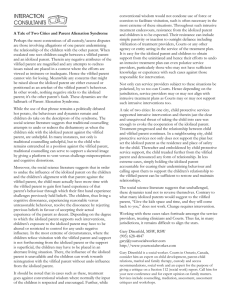Assessing and Managing School Age Children with Behavioral
advertisement

Assessing and Managing School-Age Children with Behavioral Problems Your child is about 7 years old. The teacher reports problems listening in class, sitting still and getting into conflict with peers. First thought always seems to be ADHD (attention deficit hyperactivity disorder). But what if that was not the case? Assessing school-age children with behaviour problems takes more than just a superficial look at behaviour. While many children present with the above-mentioned symptoms, the cause can range from neurological to psychological to family to social issues. By way of example, the above symptoms can be seen in children with ADHD, but can also be seen in children with allergies, or by children who are bullied and by children whose parents are undergoing separation/divorce, not to mention children who are witness to domestic violence or subject to abuse or neglect themselves. To add to the complexity, there can also be multiple variables contributing to behaviour, so a child can suffer as the result of several conditions; kind of like having a broken leg and a cold at the same time. Hence to help school-age children with behaviour problems, assessment must come before determining the management strategies. Unless you have assessed the cause of the problems correctly, wrong management strategies may be applied. The danger here is that with the wrong management strategies the behaviour may not only continue, but worsen. In some cases, people will then apply the same wrong management strategies more harshly only to then worsen problems even more. A good well-rounded assessment model takes a bio-psycho-social approach. With this model the child may be seen by a number of professionals, or at least one professional who is able to interview the parents and child as well as at least obtain school records and ask a range of questions ranging from the child’s health and development to family matters to school related issues. From a single well structured interview with a professional who takes a bio-psychosocial approach, it can then generally be determined if other professionals need to be brought in such as a medical practitioner, psychologist, speech-language pathologist, social worker or others. The result of this approach should be the determination of issues underlying the behaviour. In other words the assessment(s) should then explain the cause or causes of the behaviour problems. Thereafter, an appropriate course of action or management strategies can be recommended. Depending on the assessment results and if the causes of the behaviour problems relate to biological, psychological, family or social issues, the management strategies can include anything from medication to change of diet to individual, family or parental counseling, to special education or instruction. One thing is for sure, a mere description of a few behavioural problems as at the outset of this article cannot be relied upon to lead directly to management strategies. Dig deeper with a biopsycho-social approach to be assured of targeting the right cause and ensuring the probability of successfully helping the child in question. Gary Direnfeld, MSW, RSW (905) 628-4847 gary@yoursocialworker.com www.yoursocialworker.com Gary Direnfeld is a social worker. Courts in Ontario, Canada, consider him an expert on child development, parent-child relations, marital and family therapy, custody and access recommendations, social work and an expert for the purpose of giving a critique on a Section 112 (social work) report. Call him for your next conference and for expert opinion on family matters. Services include counselling, mediation, assessment, assessment critiques and workshops.








